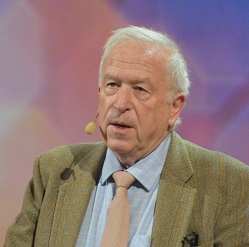“Since there is no telling in advance where it may lead, reflection can be seen as dangerous.”
Introduction, p. 11
Think (1999)
Simon Blackburn es un filósofo británico.

“Since there is no telling in advance where it may lead, reflection can be seen as dangerous.”
Introduction, p. 11
Think (1999)
Contexto: We hope for lives whose story leaves us looking admirable; we like our weaknesses to be hidden and deniable... We want to enjoy our lives, and we want to enjoy them with a good conscience... Ethics is disturbing. We are often vaguely uncomfortable when we think of such things as exploitation of the world's resources, or the way our comforts are provided by the miserable labour conditions of the third world... Racists and sexists, like antebellum slave owners in America, always have to tell themselves a story that justifies their system.
Simon Blackburn, Being Good (2001)
Fuente: Think (1999), Chapter Four, The Self, p. 136
“Finding a mechanism does not bypass the problem of induction.”
Fuente: Think (1999), Chapter Six, Reasoning, p. 227
Fuente: Think (1999), Chapter Five, God, p. 162
Fuente: Think (1999), Chapter Four, The Self, p. 146
“Motion however will not help unless we have things moving.”
Fuente: Think (1999), Chapter Seven, The World, p. 244
“Contemporary culture is not very good on responsibility.”
Fuente: Think (1999), Chapter Three, Free Will, p. 105
“Why should thinkers mock the simple pieties of the people?”
Fuente: Think (1999), Chapter Five, God, p. 190
Fuente: Think (1999), Chapter Six, Reasoning, p. 225
“Paradigms can be asked to show their worth, an some of them do not stand up.”
Fuente: Think (1999), Chapter Six, Reasoning, p. 231
Fuente: Think (1999), Chapter Three, Free Will, p. 106
“But if nothing does as well as something about which nothing can be said, it vanishes.”
Fuente: Think (1999), Chapter Five, God, p. 173
Fuente: Think (1999), Chapter Five, God, p. 170
“Perhaps to restore human freedom we should deny determinism?”
Fuente: Think (1999), Chapter Three, Free Will, p. 84
“The word "philosophy" carries unfortunate connotations: impractical, unworldly, weird.”
Introduction, p. 1
Think (1999)
Fuente: Think (1999), Chapter Eight, What To Do, p. 270
Fuente: Think (1999), Chapter Five, God, p. 169
“What underlies our assignment of probabilities in the real world?”
Fuente: Think (1999), Chapter Six, Reasoning, p. 212
Fuente: Think (1999), Chapter Two, Mind, p. 78
Fuente: Think (1999), Chapter Eight, What To Do, p. 278-279
Fuente: Think (1999), Chapter Three, Free Will, p. 117